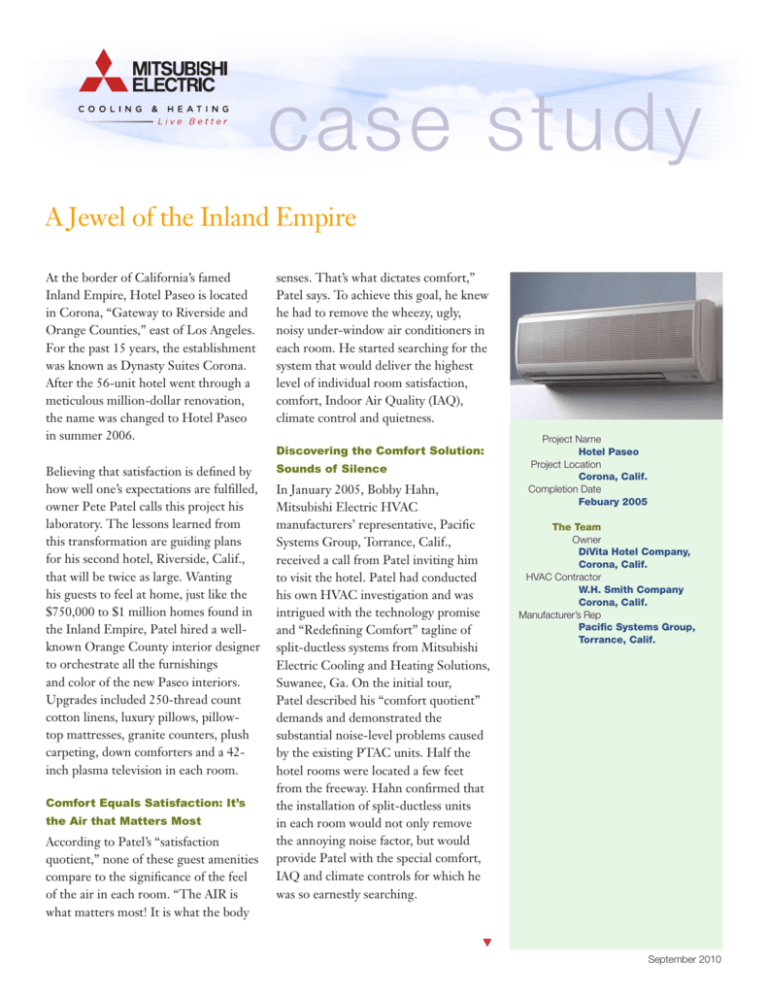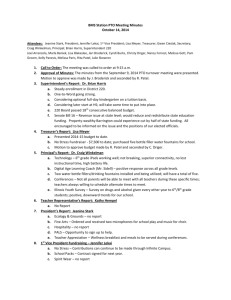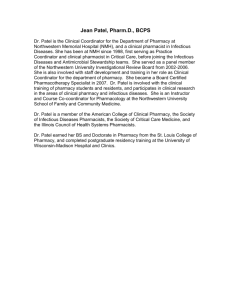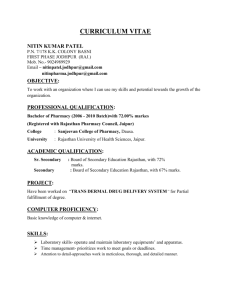case study - Case Studies
advertisement

case study A Jewel of the Inland Empire At the border of California’s famed Inland Empire, Hotel Paseo is located in Corona, “Gateway to Riverside and Orange Counties,” east of Los Angeles. For the past 15 years, the establishment was known as Dynasty Suites Corona. After the 56-unit hotel went through a meticulous million-dollar renovation, the name was changed to Hotel Paseo in summer 2006. senses. That’s what dictates comfort,” Patel says. To achieve this goal, he knew he had to remove the wheezy, ugly, noisy under-window air conditioners in each room. He started searching for the system that would deliver the highest level of individual room satisfaction, comfort, Indoor Air Quality (IAQ), climate control and quietness. Believing that satisfaction is defined by how well one’s expectations are fulfilled, owner Pete Patel calls this project his laboratory. The lessons learned from this transformation are guiding plans for his second hotel, Riverside, Calif., that will be twice as large. Wanting his guests to feel at home, just like the $750,000 to $1 million homes found in the Inland Empire, Patel hired a wellknown Orange County interior designer to orchestrate all the furnishings and color of the new Paseo interiors. Upgrades included 250-thread count cotton linens, luxury pillows, pillowtop mattresses, granite counters, plush carpeting, down comforters and a 42inch plasma television in each room. Sounds of Silence Comfort Equals Satisfaction: It’s the Air that Matters Most According to Patel’s “satisfaction quotient,” none of these guest amenities compare to the significance of the feel of the air in each room. “The AIR is what matters most! It is what the body Discovering the Comfort Solution: In January 2005, Bobby Hahn, Mitsubishi Electric HVAC manufacturers’ representative, Pacific Systems Group, Torrance, Calif., received a call from Patel inviting him to visit the hotel. Patel had conducted his own HVAC investigation and was intrigued with the technology promise and “Redefining Comfort” tagline of split-ductless systems from Mitsubishi Electric Cooling and Heating Solutions, Suwanee, Ga. On the initial tour, Patel described his “comfort quotient” demands and demonstrated the substantial noise-level problems caused by the existing PTAC units. Half the hotel rooms were located a few feet from the freeway. Hahn confirmed that the installation of split-ductless units in each room would not only remove the annoying noise factor, but would provide Patel with the special comfort, IAQ and climate controls for which he was so earnestly searching. Project Name Hotel Paseo Project Location Corona, Calif. Completion Date Febuary 2005 The Team Owner DiVita Hotel Company, Corona, Calif. HVAC Contractor W.H. Smith Company Corona, Calif. Manufacturer’s Rep Pacific Systems Group, Torrance, Calif. September 2010 case study Cutting Annoying Noise Levels in Half Patel’s research was thorough. He commissioned a local sound engineering firm to study the problem. Results confirmed that, according to guidelines from the Air-conditioning and Refrigeration Institute (ARI), noise levels generated by the nearby freeway (California Highway 91) reached in excess of 80 dB(A). Patel learned that the human ear is comfortable with sound levels of half that amount, approximately 43 dB(A). Further, the study showed that his old PTAC units were allowing freeway noise to penetrate the rooms at a level that measured well above 50 dB(A). Hahn demonstrated to Patel that the Mitsubishi Electric units he was recommending for installation in each room and the hotel offices would cut the current noise levels in half. Not only would the units run with extreme quietness, 25dB(A) on the lowest setting, but the main source of the trying noise would be eliminated because Mitsubishi Electric units only require an opening the size of a tennis ball in the exterior wall for refrigerant piping and electrical lines. Mitsubishi Electric Specifications for Hotel Paseo: Improving the IAQ Hahn specified indoor wall-mounted air conditioners and heat pumps which would provide each room with the perfect year-round comfort, dryness, climate control and IAQ so important to Patel. With the EPA reporting today’s indoor pollution levels at two to five times higher than outdoors, and with travelers facing a variety of health risks, from driving in cars and flying in planes to staying in hotels, Patel understood the importance of controlling indoor pollution for Hotel Paseo guests. He was attracted to the cost and timesaving convenience of the long-life and washable Mitsubishi Electric filters that help create a better indoor environment. Patel was attracted to the MSH systems because they are easy to install, are mounted high on each wall (over each desk at Hotel Paseo), and blend into the room environments without taking up any window space. He saw that each MSH09TW indoor unit would be connected with lines to an MUH09TW outdoor unit masked with landscaping on the hotel’s exterior. For the hotel office spaces, Hahn specified the MXZ30TN 3:1 INVERTER-driven multi-zone heat pump system. He told Patel that each outdoor unit is capable of delivering powerful cooling and heating to wallmounted units in three different rooms. This 3:1 multi-system provides up to 30,500 Btu/h of cooling or 38,000 Btu/h of heating. The $1 Million Renovation Patel acted on Hahn’s specifications and spent most of 2005 extensively refurbishing each room, starting with the extraction of the old PTACs and adding masonry to the exterior walls to cover the holes through which most of the freeway noise entered each The Mitsubishi Electric system installed at Hotel Paseo enhanced guest comfort by reducing indoor noise and providing temperature control. case study room. Following the installation of the primary “satisfaction” component (the AIR), Patel then added hardwood floors, shutters, custom counter tops and furniture, plasma TVs, Berber carpet and porcelain tile. Individual Comfort Controls with Motion Sensors Finally, Patel had another demand for Hahn. He wanted the individual room controls to come from another manufacturer who makes controls with motion sensors especially for hotel rooms. To further demonstrate the flexibility and innovation of the splitductless product technology, Hahn sent the system schematics for the indoor fan coils to the manufacturer who then hard-wired their control units to work seamlessly with the Mitsubishi Electric indoor air handlers. An energy-saving device, the motion sensors turn the Mitsubishi Electric units on ONLY when a guest enters the room and the door closes. When housekeeping is cleaning, the doors are left open signaling to the controller NOT to turn the system on. This has worked flawlessly, according to Patel, and his guests like the feature. “It is still too early to measure the success of my cost savings,” Patel says, “but I am measuring the savings each month, and this time next year I will have another Mitsubishi Electric benefits story to tell.” See if the Red Light Is On Patel says that his choice of selecting Mitsubishi Electric split-ductless systems has paid off handsomely. Frequent guests now request rooms right on the freeway because of their comfort and low noise levels. “The only way a guest knows that his/her air conditioner is running is by looking to see if the red light is on,” Patel says. “Finally, the quality of the air in each one of my rooms matches the high quality of the furnishings.” The Comforts of Home “Hotel Paseo is not about royalty,” Patel says. “We didn’t design this renovation to give our guests the feeling of being in a five star, luxury hotel. We were consciously striving for a feeling of comfort, satisfaction and value received. It’s all about having the right kind of experience. You know that you can expect all the comforts and amenities of home. You know your experience will be enjoyable, satisfying, and you won’t overpay.” Mitsubishi Electric Equipment Installed (42) MSH09TW Wall-mounted Indoor Air Handlers (5) MXZ30TN INVERTER Outdoor Units (37) MUH09TW Outdoor Units







